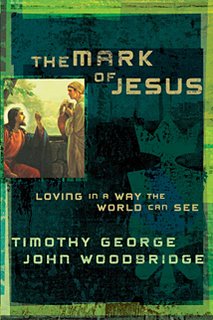 As I mentioned in my last post, I was reading The Mark of Jesus. It is a great follow-up to Mark of the Christian by Francis Schaeffer. If you haven't guessed yet, the mark of the Christian/of Jesus is love. In their excellent book, Timothy George & John Woodbridge discuss 5 arenas where the follower of Jesus can demonstrate his love. These are
As I mentioned in my last post, I was reading The Mark of Jesus. It is a great follow-up to Mark of the Christian by Francis Schaeffer. If you haven't guessed yet, the mark of the Christian/of Jesus is love. In their excellent book, Timothy George & John Woodbridge discuss 5 arenas where the follower of Jesus can demonstrate his love. These are 1. Our Neighbor
2. Within Evengelical Bounds
3. Those who look down upon us / "enemies"
4. The Larger "Christian" Community (not necessarily evangelical)
5. Those of other world religions
With the EFCA currently going through a discussion on the revision of our Statement of Faith, I want to focus on the second of these in this review.
Jesus prays in John 17, "I pray also for those who will believe in me through their message, that all of them may be one, Father, just as you are in me and I am in you. May they also be in us so that the world may believe that you have sent me. I have given them the glory that you gave me, that they may be one as we are one: I in them and you in me. May they be brought to complete unity to let the world know that you sent me and have loved them even as you have loved me" (v20-23).
This is the essence of the chapter on evangelical unity in The Mark of Jesus. They discuss the importance of doctrine in relation to unity, the role of creeds & the difference between major issues & minor issues.
The authors quote puritan writer Richard Baxter saying, "In things necessary, there must be unity; in things less than necessary, there must be liberty; and in all things, there must be charity." The thing, though, is what is "less than necessary" & what is "necessary"?
In my mind necessary matters would be those in regards to salvation. There can be no watering down of that doctrine. It seems this may also be the authors opinion as well. "The essence of Christianity, according to the New Testament, is knowing & trusting Jesus Christ, not in the abstract, but precisely as Lord, the incarnate Son of God, as Prophet, Priest, & King, as Savior, Redeemer, & Victor."
The authors then provide 3 general provisions not to unify. They are,
1. We do not achieve unity by compromising our convictions
2. We must never seek togetherness for mere prudential reasons
3. We must never imagine that doctrinal matters are trivial or unimportant
That being said, they ask we can work together.
This, I think, is important for those within the EFCA to hear (on either side of the issue).
"Make careful distinction between primary doctrines of the faith, which may not be compromised without betraying the Gospel, & secondary issues, which may be important but not essential for fellowship. Everything in God's Word is true & important or else it would not be there, but not everything is of equal importance in every respect. The second coming of Christ, for example, is a cardinal doctrine of the Christian faith. To deny it is to lapse into serious heresy. But earnest, Bible-believing Christians may honestly differ on some details of the end times without breaking fellowship with one another. Confessions of faith record the distinctive beliefs of local churches & various associations of Christians, & they can be very useful in helping Christians to distinguish primary & secondary matters of faith. But we must never forget that all such confessions are accountable to, & revisable in light of. the Bible."
We are to be known for our love, & as Dr. Schaeffer said, the world can (& will) judge to see if we are Christians by our love.
Evangelical unity is very important. The authors see it as such & I believe that we should as well.
This is a great read. The other chapters only offer more of the same within their own realms.





1 comment:
haven't read the book yet, but enjoyed reading your thoughts on its application to the current proposal to revise the SoF.
thanks!
Post a Comment